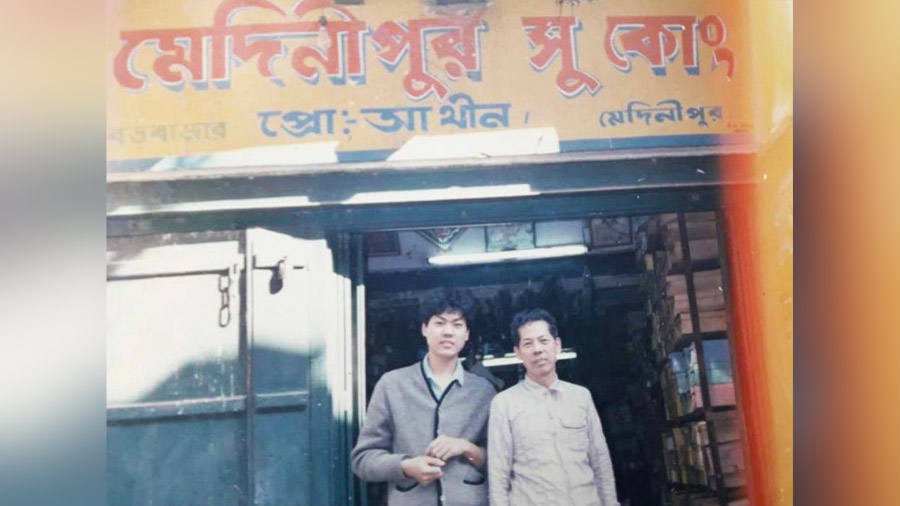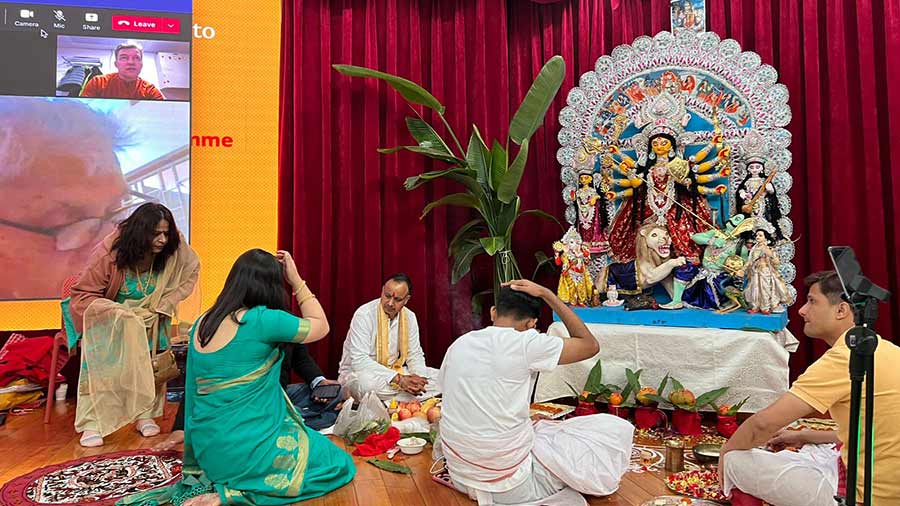Bengal’s Unesco-tagged festival, Durgotsav or Durga Puja, is celebrated every year across the world. Taiwan is no exception, with at least five different groups of Bengalis in four Taiwanese cities welcoming Durga and her family this autumn as well.
The longest-running Durgotsav, organised by the Taiwan Bengali Association (TBA), is turning 15 this year, while a group of Bengali professionals and scholars are also continuing with their annual Durga Puja ritual in Taiwan’s semi-conductor hub of Hsinchu and Linkou on the outskirts of Taipei. Meanwhile, the fourth Durgotsav in north Taiwan is being organised by a breakaway group of young and old-time Bengali students at Nangang in New Taipei City. But the fifth and the newest in Taiwan, the only Durgotsav in South Taiwan, is truly unique.
Saviour of South Taiwan’s Durgotsav

Rodney Lin in the present day
The two-day event will be hosted at the home of a third-generation Chinese from West Bengal. It all started with Rodney Lin, whose Taiwanese passport name is Ping-ju Lin, attending the first-ever Durga Puja meeting by a group of Bengali students and research scholars from south Taiwan’s Tainan and Kaohsiung last year. When this bunch of youngsters huddled online, thanks to the prolonged Covid-19 restrictions across the island nation, to plan their maiden Durgotsav at the National Cheng Kung University (NCKU) in Tainan in 2022, Lin, currently a resident of Taiwan’s biggest port city, turned out to be a messiah.
The middle-aged man from Midnapore, who migrated to Taiwan from India in the early-1990s for greener pastures, provided much of the logistic support to the young organisers who were struggling to find resources in a foreign land. Apart from introducing himself by his Bengali name of Sanai, given by one of his father’s acquaintances in Midnapore town along with the rhyming nickname of his elder brother Kanai, Lin not only supplied the large utensils and containers required for puja and preparing prasad and bhog but took the organisers and the members by surprise when he brought out a chandmala, an item essential for the puja, from his personal collection as they were desperately seeking one on foreign soil.
Missing Midnapore in Kaohsiung
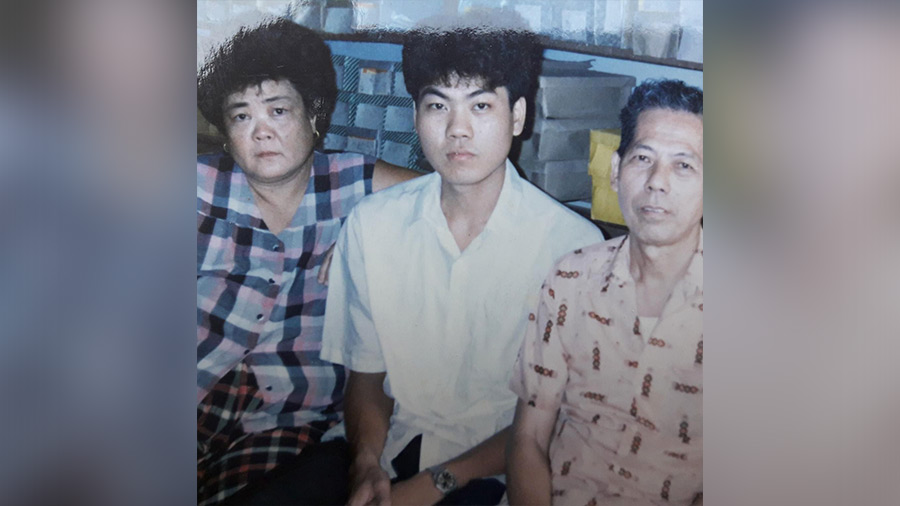
Lin with his parents many years ago
But this year, when the same group of Bengali students and scholars decided to shift the Durgotsav in Kaohsiung owing to difficulties in finding a suitable and cost-effective venue in Taiwan’s former capital of Tainan, their very own Sanai da was the saviour. Soon after hearing their plight of getting a place to perform the Puja, Lin provided two floors of his multi-storeyed residence in the port city to celebrate the days of fun, frolic and festivities. “Durga Puja has been a large and most memorable part of my nostalgia. As a kid, I used to go on pandal-hopping across Midnapore town with my friends and acquaintances and savoured the bhog and other archetypal Bengali delicacies like ghoogni, aloo kabli and phuchka outside the pandals. I still remember watching the movie Dadar Kirti with my friends and humming those songs during pandal-hopping,” Lin mentioned in chaste Bengali using colloquial lingos like hebby and phataphati.
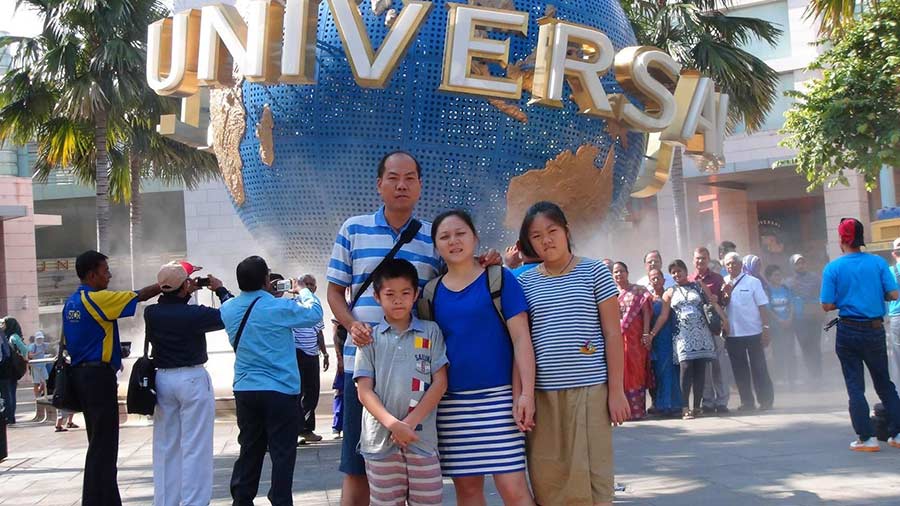
Lin with wife and children
“My grandfather had migrated to Kolkata from China’s Guangdong province, and later my father relocated to Midnapore from Kolkata’s China Town to set up his shoe business, the Midnapore Shoe House,” shared Lin. “We were the only Chinese family in the town, and I grew up there pursuing studies in a Kharagpur school. With the Chinese shoe-making and dentistry businesses starting to dwindle and opportunities for Chinese in India drying up in the “trade union terrorism-hit Bengal” in the 1980s, Lin joined the restaurant industry without pursuing higher studies.
Pan-India sojourn for greener pastures
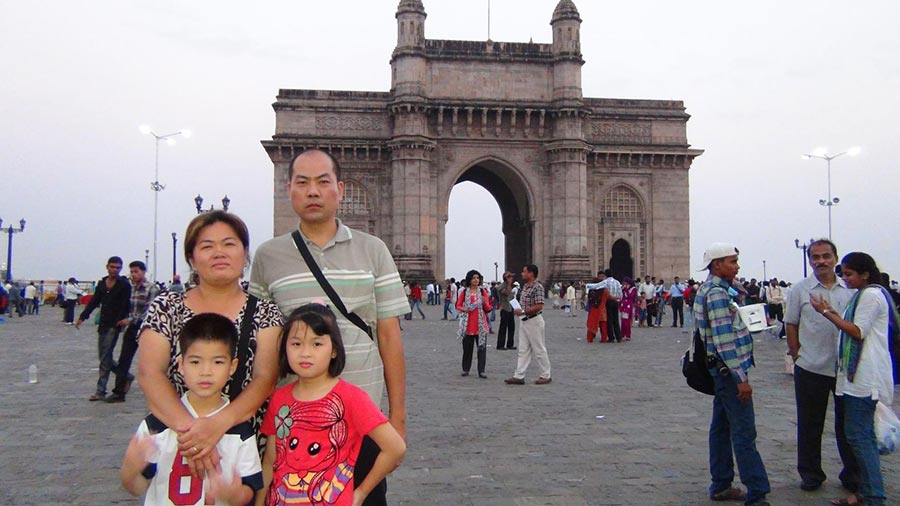
In Mumbai with his cousin sister and her children
Apart from working for a slew of Chinese restaurants in Kolkata’s China Towns of Tiretta Bazar and Tangra, he worked for Liu’s ‘Waldorf’ in Chennai, and the iconic Chinese eatery in Mumbai, China Garden, claimed to be the birthplace of the popular Chicken Manchurian by its owner Nelson Wang. “It was more of a media creation than reality. The dish, adding ginger garlic paste, soya sauce, corn starch and ajinomoto, was not new in Chinese eateries in Kolkata and other parts of Bengal, but Wang, with his close friendship with the A-listers of Mumbai those days, including Shammi Kapoor and Parameshwar Godrej, created a brand for himself and used the repackaged and rebranded Chicken Manchurian to as part of building his culinary charisma,” Lin explained.
He was working at a Chinese restaurant in Chandigarh at the height of the Khalistan movement and the turbulent times forced him to relocate to other places in India. “My brother, who was running a restaurant in Taichung in those days, asked me to come to Taiwan, not so well-known among the Indians those days but for Chinese-origin people like us, it was a safe haven to relocate and restart a new life as the rules of residency for overseas Chinese were much simpler and hassle-free than these days,” Lin, an Overseas Citizen of India (OCI) card-holder, revealed.
A serial food and beverage entrepreneur
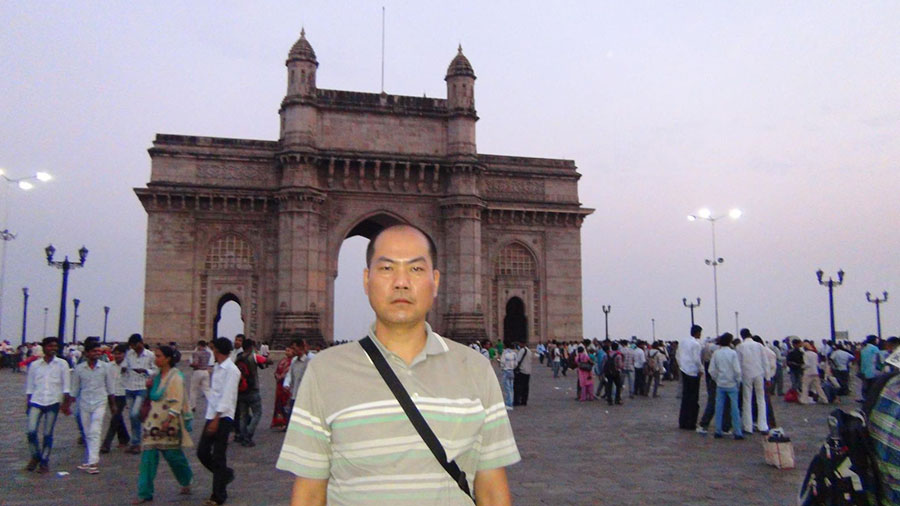
Lin, an Overseas Citizen of India (OCI) card-holder, in Mumbai
After working for a few years at a bar, Lin eventually decided to launch his own restaurant in Kaohsiung, and since then the enterprising school dropout has become a serial food and beverage entrepreneur. So far, he has run more than five restaurants in the south Taiwanese city, and his last venture, Dhaba, was closed down during the pandemic. The empty restaurant space on the ground floor of his house will be the venue for the second Durgotsav of south Taiwan’s Bengali community, and he has given it for free, alongside its well-equipped kitchen with all kinds of utensils and the whole third floor of his four-storeyed house, where he lives with his China-born wife and college-going daughter and son.
“Even though I have been regularly visiting Kolkata and India for years, all these decades in Taiwan, I have missed Durga Puja a lot. It was a great moment of happiness for me when I attended last year’s Puja in Tainan, and I couldn’t have asked for more since the organisers chose my place to celebrate our biggest Bengali festival on October 21 and 22,” a tall Lin, who used to be called Lombu for his height by his Indian friends and co-workers, gleefully expressed while standing in front of the photographs of Sri Ramakrishna Paramhansa, Ma Sarada, Swami Vivekananda and Baba Lokenath in his drawing room. But his eyes were glued to the giant TV screen where he was watching the Asia Cup final live.
“I have been following cricket since childhood and Navjot Singh Sidhu was my favourite cricketer for hitting sixes.” The 50-something Chinese remarked while continuing his adda with the young Bengali organisers at his home during the Durga Puja preparations meeting.
(Suvam Pal is an Indian author, journalist and documentary filmmaker based in Taipei)
